- Home
- Francine Rivers
Unafraid_Mary Page 4
Unafraid_Mary Read online
Page 4
Taking up her shawl, Mary went to the cave entrance and gazed up at the night sky. Was it her imagination that one star shone more brightly than all the others? It was like a shaft of light breaking through the floor of heaven and shining down on the City of David. Had not the prophet Joel said the Lord would display wonders in the sky and on the earth when the Savior came?
Lifting her shawl, Mary covered her hair. “Lord Most High, Creator of all people, you who dwell in heaven so far above us, you who are holy, I love you.” She pressed her clasped hands against her heart. “I adore you. There is no other like you in all the universe.” She closed her eyes, her heart filled with confident hope. “You have made me the vessel for your Son. Your kingdom will come. Through him, you will reign upon the earth as you do in heaven.” She looked up again. “Blessed be the name of the Lord, and blessed be the name of your Son, Jesus.”
The cold night breeze rippled her thin dress. She hugged her arms around her. Though chilled, she remained at the cave entrance a moment longer, thinking about the day the angel of the Lord had come to her with the announcement that she would bear God’s Son. She thought of Joseph’s dream and his acceptance of her and the miracle child she carried. She thought how even a Roman emperor unwittingly obeyed the will of the Lord by commanding the census that called Joseph home to Bethlehem, so that the prophecy about the place of the Messiah’s birth would be fulfilled. She thought about the shepherds who had received the news of the Messiah’s birth from the angels.
And the more she thought about the things that had happened, the more she realized her mind could not fathom all that the Lord had planned and would accomplish through her son.
Her gaze drifted over the landscape. She looked up at Herod’s palace on the mount overlooking Bethlehem. Up there dwelt an earthly king so jealous of his power that he had murdered his wife, Mariamne, and two of his sons. Shuddering, she stared at the lighted windows of the great castle. They seemed to stare down at her.
Weariness swept over her and she turned away from the mouth of the cave. She must rest so she would be ready when Jesus needed to be nursed again. Yawning, she returned to the bed Joseph had made. The hay rustled as she sat, and her husband awakened. He started to rise, but she put her hand against his shoulder. “Everything is fine, Joseph. Go back to sleep.” As she lay down, he drew her close and pulled the blanket over them both. He asked her if she was warm enough and tucked her closer.
Outside, God’s sentinels stood guard against the one who would destroy the child. Finding no way to enter into the humble sanctum, Satan turned away in a cold blast of fury.
I will find another way to kill the one who threatens my domain!
His minions came to report that men were traveling from the ends of the earth to see the king the new star announced.
I will draw them off the track to Herod, for then my will shall be accomplished on earth. Dark laughter echoed in the night while Mary and Joseph slept.
Only Jesus awakened and heard.
MARY held Jesus close to her heart as she and Joseph entered the Temple. They had traveled to Jerusalem to offer a sacrifice for their son, in accordance with the Jewish Law. Joseph went from booth to booth until he found two turtledoves he deemed perfect enough to take to the priest.
Eyeing the two small birds, Joseph sighed with regret. “If only I had enough money for a lamb.”
Touched deeply by her husband’s humility, Mary smiled up at him. “It was a dove who bore the message to Noah that God had stayed his hand of judgment.”
Joseph’s face softened as he put his arm around her. As they went up the steps together, she stared in awe at the immensity of the temple Herod had built. The deep beckoning sound of the shofar pulled her attention upward, where she saw the priests standing on their platforms holding the long rams’ horns to their lips. Mary trembled as she heard the sound. Her throat closed. Masses of pilgrims moved in and out of the courts, filling the corridor with the rumble of a thousand voices. Lambs bleated; cattle lowed. Money changers vied for business, coins clinking into trays as men argued over percentages of exchange.
“Do you think the Lord does not see how you’re robbing me?” someone cried out angrily.
“If you don’t like it, see if you can do better!”
“May the Lord judge between you and me!”
Joseph hastened Mary past the disturbance and escorted her along the corridor to the entrance to the women’s court, where other women and children waited. He left her there with Jesus and went to present the turtledoves to a priest for sacrifice.
An old man wandered among the women holding babies, pausing to peer down into each infant’s face and give a soft blessing to the proud mother before moving on to another. Mary heard an older woman address him. “Simeon . . .” They spoke briefly before he turned away again. She felt his gaze fix upon her.
“What child is this?” he said in the quavering voice of advanced age.
“His name is Jesus.” Mary tipped her son proudly, drawing the blanket down enough so the old man could admire him. Could anyone guess she held the Messiah in her arms? She, a mere peasant girl from Nazareth?
“Jesus,” Simeon repeated softly. “‘The Lord saves.’ A common name in Israel, for it is the desire of every devout girl to bear the one who will save his people from their sins.”
Mary’s heart fluttered strangely as she looked into the venerable man’s opaque eyes. Though he was almost blind, he seemed to be looking for something with great longing. She felt impelled to say more. “I did not give him the name. It is his name.”
Frowning slightly, the old man fixed his gaze upon her son again. He leaned closer that he might see him better. Mary smiled as Jesus made a soft mewling sound and awakened. The old man’s face flushed. “May I hold him?” He held out trembling hands.
Mary hesitated only briefly before relinquishing Jesus. She studied Simeon’s face while he held her son, gratified by the man’s increasing excitement. Jesus reached up, his tiny fingers grasping the long white curl at Simeon’s temple. Simeon drew in his breath sharply and uttered a sob.
Alarmed, Mary stood closer lest the old man drop her baby. Simeon raised his head, and Mary held her breath. She saw immediately the change in him. Simeon’s eyes were no longer milky, but dark brown and alight with joy. Her heart raced wildly. When Jesus let go of the curl at Simeon’s temple, the old man cupped Jesus’ tiny hand and kissed his palm.
“Lord,” Simeon said in a trembling voice, “now I can die in peace! As you promised me, I have seen the Savior you have given to all people. He is a light to reveal God to the nations, and he is the glory of your people Israel!” Smiling, he wept, staring and staring at Jesus as though he could not get his fill of seeing him. “Lord, Lord . . .”
“Mary?” Joseph said softly, standing at her elbow.
“It’s all right,” she said, unaware until then of the tears pouring down her own cheeks. Here was a devout man who resided in the Temple, and he recognized her son as the Messiah.
Simeon raised his head and looked at each of them. “May the Lord watch over and protect you as you rear up this child in the ways of his Father. This child will be rejected by many in Israel, and it will be their undoing.”
The word rejected struck Mary’s heart. Who in Israel would reject the Messiah? Didn’t all crave for things to be put right between man and God? Surely the priests and elders would rejoice. Even the high priest would come out to greet him.
Simeon didn’t explain. He looked upon Jesus again. “But he will be the greatest joy to many others.” He placed Jesus back in Mary’s arms. Then, surprising her, he reached out with both hands and cupped her face tenderly as one would a favored daughter. His face was filled with sorrow and compassion. “Thus, the deepest thoughts of many hearts will be revealed. And a sword will pierce your very soul.”
Troubled by his words, Mary wanted to ask what he meant, but Joseph’s hand was gently pressing against the small of her back. “We shou
ld go, Mary.” Heeding his instruction, she bowed her head to Simeon and turned away.
As they came out into the corridor, Mary saw men and women drawing aside as an old woman stooped with age and garbed in widow’s black hurried toward the women’s court. People whispered close by: “It is Anna, the daughter of Phanuel of the tribe of Asher. . . . My mother said she came into the Temple when her husband died. . . . She’d dedicated her life to serving God night and day with fasting and prayers. . . . She is said to be a prophetess. . . .”
Mary glanced back and saw Simeon standing in the corridor, his gaze still fixed upon Jesus. As she turned away, she saw that the old woman was heading straight for her and Joseph. “He is come!” The old woman gazed adoringly at Jesus in Mary’s arms. Spreading her hands, she closed her eyes and lifted her head, speaking joyfully. “Out of the stump of David’s family will grow a shoot—yes, a new Branch bearing fruit from the old root. And the Spirit of the Lord will rest on him—the Spirit of wisdom and understanding, the Spirit of counsel and might, the Spirit of knowledge and the fear of the Lord. He will delight in obeying the Lord. He will never judge by appearance, false evidence, or hearsay. He will defend the poor and the exploited. He will rule against the wicked and destroy them with the breath of his mouth.”
Yes! Mary wanted to cry out. My son will break the chains that bind us. Rome will no longer rule the world. My son will rule. My son will make all things right.
Joseph’s hand clenched Mary’s arm, drawing her back. “We must go, Mary. We must go now.”
“But she is announcing the Day of the Lord.”
“Yes, and Herod’s spies are everywhere, even inside the Temple.”
Mary understood his warning immediately. Herod had killed his favorite wife and two sons over an imagined threat to his throne. The Messiah was a rival, for he would one day remove the power of all earthly kings. “Yes, of course,” she said, leaning into Joseph’s lead as he drew her into the crowd. She must protect her son until he was old enough to take his proper place. They lost themselves in the throng who pressed in to hear the prophetess speak of the coming Messiah. Still, Mary’s heart raced, for the Lord had seen to it that the Messiah’s birth was announced in the Temple.
As they neared the doorway to the outside, Mary saw a man standing to one side. He looked straight into her eyes, his own so black they seemed to open into the black pit of his soul. She had never seen eyes so filled with hatred and violence. “Joseph!” she cried out in alarm, and her husband’s arm came firmly around her. She held Jesus closer as they hurried down the steps.
“What did you see?” Joseph said as they hurried away from the Temple mount.
“A man, Joseph, just a man,” she said, out of breath.
A man who had the eyes of death.
Joseph decided it would be best if they remained in Beth-lehem, away from the gossip surrounding their hasty marriage in Nazareth. Soon after the visit to the Temple, Joseph found a small house on the edge of town in which they could live comfortably. There was enough room for him to set up shop and ply his carpenter’s trade. They moved in with their few possessions. Joseph left for a few days with his donkey to dig up tree stumps so that he would have wood. Upon his return, he went straight to work making utensils, bowls, and dishes to sell in the markets of Jerusalem.
Each morning, Mary carried Jesus to the well in a blanket sling and drew up fresh water for the day’s use. While at her household chores, she kept Jesus beside her in a cradle Joseph had made. Often, she would carry Jesus into Joseph’s shop so her husband would see each change in their son. “He’s smiling, Joseph! Look!” And Joseph would laugh in delight with her.
Jesus was sitting up at six months and crawling at seven. At ten months, he gripped Joseph’s fingers and pulled himself up. Joseph loved the sound of his baby chuckles and his intent interest in everything around him. At eleven months, he was toddling after Mary; at twelve months, he had his first skinned knee. Sometimes Jesus seemed like any other child, and at others, Joseph experienced a wave of awe when Jesus looked at him with eyes at once innocent and wise.
Each morning and evening, Joseph read to Mary and Jesus from the scrolls that had been in his family since the time of David. On one particular evening, Jesus played quietly on a mat, filling a toy boat with pairs of carved animals Joseph had made. Joseph paused in his reading to watch Jesus, his heart swelling within him. Jesus put two small sheep inside the boat, closed the door, latched it and clapped his tiny hands. Joseph lowered the scroll to his lap. “Do you ever wonder how much he knows, Mary?”
“Every day.” She, too, studied Jesus as he played.
Joseph smiled ruefully. “I wonder why the Lord didn’t choose a more learned man, one who could provide a better home for Jesus.”
“By better, you mean ‘finer.’”
“Surely the Son of God deserves finer.”
“Hasn’t God always chosen things the world considers foolish in order to shame those who think they are wise? Maybe God chose a peasant girl to be his mother and a carpenter to be his earthly father because the Messiah is meant for all our people, not just those who dwell in the fine houses of the provinces or the palaces of Jerusalem.”
A knock startled them. “Who would come at this hour?” Mary lifted Jesus and held him close, while Joseph quickly rolled the scroll and put it back in the trunk against the wall. When Joseph opened the door, Mary heard strangers’ voices speaking in stumbling, heavily accented Aramaic. She heard Joseph say yes, and the men cried out happily. Joseph glanced back at her, his eyes bright with excitement. “These men have come from the East.”
“Who are they?”
“Learned men who study the heavens. They’ve been following a new star they say announces the birth of the King of the Jews. They’ve come to worship him.”
Mary stepped forward. “Invite them in, Joseph.”
“They’re Gentiles, Mary, and will defile the house.”
“How can they defile the house when the Lord himself has sent them?”
Joseph nodded. Turning back, he opened the door wider. Men in foreign dress began to crowd into the small house. Mary drew back to give them more room, for there were four, each accompanied by a servant. They stared at Jesus with a mingling of joy and awe. One by one, they knelt and bowed their heads to the ground before him.
Jesus pressed at her so that she knew he wanted down. She set him on his feet, keeping close watch over the strangers and her son.
“We have brought gifts,” one said thickly. Turning to his servant, he took a carved box and opened it. Astonished, Mary saw it was filled with gold coins. She had never seen so much money, except at the table of the money changers in the Temple. It was more than Joseph would make in a lifetime. The next man handed her an embroidered leather bag. “Frankincense.” The third man set down another box of coins, while the fourth placed a sealed alabaster bottle on the floor mat at her feet. “Myrrh.”
Mary marveled at such gifts. They had brought gold as a tribute to her son who would be king, frankincense for him to burn as an offering in the Temple, and myrrh as a fragrant balm to anoint his body.
Jesus paid no attention to the gifts, but toddled among the men who had come to worship him, touching their faces and turbans, and peering into their eyes. He even went to the servants, who ducked their heads to the earthen floor rather than allow him to touch them. Jesus sat among them, opened the little toy boat, and spilled out the animals once again.
Joseph laughed. “Come. Be at ease. We don’t have much, but what we have we offer you.” He poured wine and broke bread and listened with great interest as the men told them about their long journey to Judah. Mary sat on the mat with Jesus while he played with his boat and animals. She listened to everything that was said. When Jesus yawned, she took him up in her arms and put him to bed.
Only then did the conversation turn to the dangers surrounding her son.
“We went to Herod and asked, ‘Where is the newborn king of the
Jews?’ We told him about the new star, and how we had traveled so far to worship this newborn king.”
Joseph’s face was suddenly pale. “And what did King Herod say?”
The oldest of the four sojourners spoke gravely. “He called for the leading priests and teachers of your people and inquired of them. They said the Messiah was to be born in Bethlehem of Judah. For one of your prophets said, ‘O Bethlehem of Judah, you are not just a lowly village in Judah, for a ruler will come from you who will be the shepherd for my people Israel.’”
“We were on our way out of the palace when Herod’s servant came to us,” said another. “He whispered to speak to us in private.”
“King Herod told us to go and search carefully for the child, and when we found him to go back and tell him so that he too could come and worship him.”
Mary saw the fear come into Joseph’s eyes. “And when will you do this?”
“Don’t be troubled, Joseph,” the oldest of the company said. “King Herod’s reputation is known among the nations.” He leaned forward and clasped his hands between his knees. “And a messenger of God came to us and warned us against returning to the palace.”
Mary looked at Joseph, but his attention was fixed upon the men.
“It is our habit to sleep by day so that we can follow the star by night,” another said. “Yesterday, after leaving Herod’s palace, we stayed at an inn in Jerusalem.”
“And all of us had the same dream.”
“The exact same dream.”
The oldest man lifted his hand to calm the excitement of the others. “We were all told not to return to Herod, but to go home another way.”
“Herod will seek you out,” Joseph said grimly.
“He will send men to look for a company of magi with their servants, but he will not find us. Each of us will be heading in a different direction. Babylon, Assyria, Macedonia, Persia. You will have only a few days before the king realizes we have gone. Then he will begin hunting for the child.”

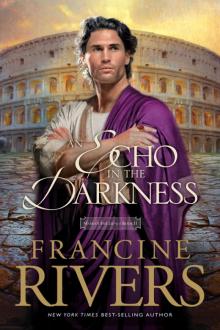 An Echo in the Darkness
An Echo in the Darkness A Lineage of Grace
A Lineage of Grace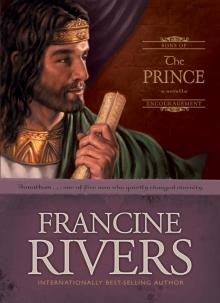 The Prince: Jonathan
The Prince: Jonathan Bridge to Haven
Bridge to Haven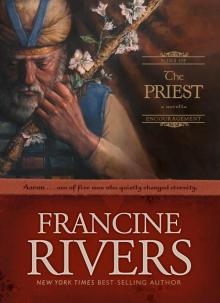 The Priest: Aaron
The Priest: Aaron Her Mother's Hope
Her Mother's Hope Redeeming Love
Redeeming Love The Scarlet Thread
The Scarlet Thread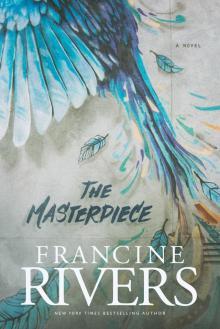 The Masterpiece
The Masterpiece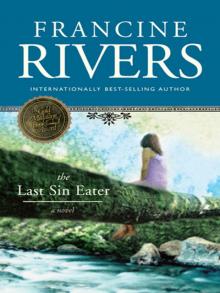 The Last Sin Eater
The Last Sin Eater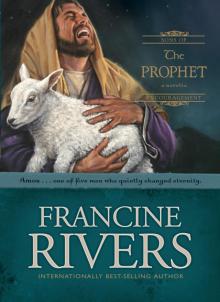 The Prophet: Amos
The Prophet: Amos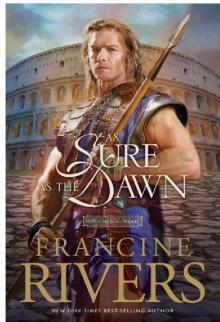 As Sure as the Dawn
As Sure as the Dawn Her Daughter's Dream
Her Daughter's Dream A Voice in the Wind
A Voice in the Wind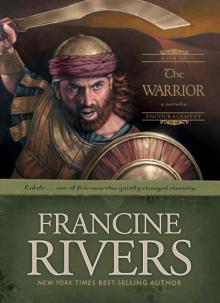 The Warrior: Caleb
The Warrior: Caleb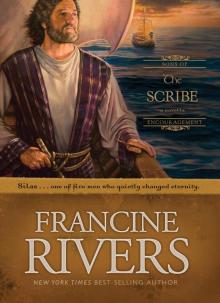 The Scribe: Silas
The Scribe: Silas And the Shofar Blew
And the Shofar Blew The Atonement Child
The Atonement Child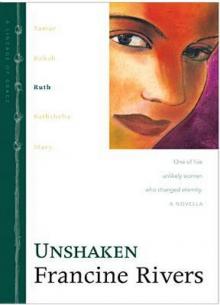 Unshaken_Ruth
Unshaken_Ruth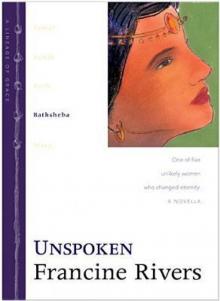 Unspoken_Bathsheba
Unspoken_Bathsheba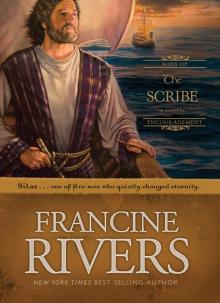 The Scribe
The Scribe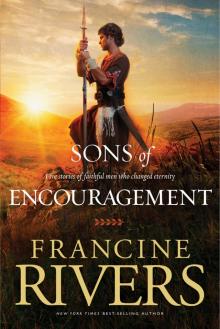 Sons of Encouragement
Sons of Encouragement The Shoe Box
The Shoe Box Sycamore Hill
Sycamore Hill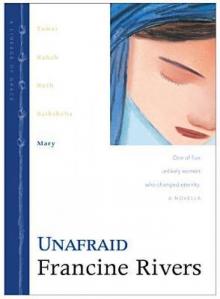 Unafraid_Mary
Unafraid_Mary Marta's Legacy Collection
Marta's Legacy Collection